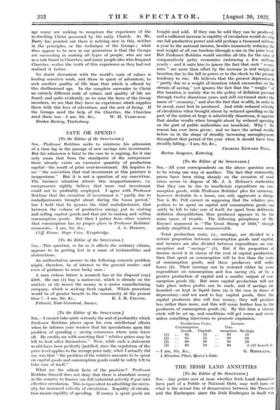[To the Editor of the SPECTATOR.] SIR,—I cannot take quite
seriously the seal of profundity which Professor Robbins places upon his own intellectual efforts when he informs your readers that his speculations upon the problem of spending v. saving commence where mine leave off. He credits me with asserting that relative prices may be left to look after themselves." Now, while such a statement would have been perfectly justified, since the regulation of the price level applies to the average price only, what I actually did say was that " the problem of the relative amounts to be spent on capital goods and consumption goods could be safely left to take care of itself."
What are the salient facts of the position ? Professor Robbins himself does not deny that there is abundant money in the country to finance our full industrial activity if put into effective circulation. This is equivalent to admitting the neces- sity for increased velocity of circulation. Rapidity of circula- tion means rapidity of spending. If money is spent goods are bought and sold. If they can be sold they can be produced, and a sufficient increase in rapidity of circulation would develop our full productive power and add perhaps a thousand millions a year to the national income, besides immensely reducing the real weight of all our burdens through a rise in the price level. But Professor Robbins would sacrifice all this for the sake of comparatively petty economies embracing a few millions yearly ; and it suits him to ignore the fact that such " econo- mies " are more than offset by the increase in real weight of taxation due to the fall in prices or to the check to the present tendency to rise. He believes that the present depression is " partly due to a weight of taxation which encroaches on the stream, of saving," yet ignores the fact that the " weight " of this taxation is mainly due to the policy of deflation pursued through twelve disastrous years and still continued under the name of " economy," and also the fact that waalth, in order to be saved, must first be produced. And while reduced velocity of circulation when brought about by reduced spending on the part of the nation at large is admittedly disastrous, it appears that similar results when brought about by reduced spending on the part of public authorities are beneficial. Why ? No reason has ever been given ; and we have the actual results before us in the shape of steadily increasing unemployment throughout that period of the year when it should have been steadily falling.—I am, Sir, &c., Barton Seagrave, Kettering.
CHARLES EDWARD PELL.






























 Previous page
Previous page